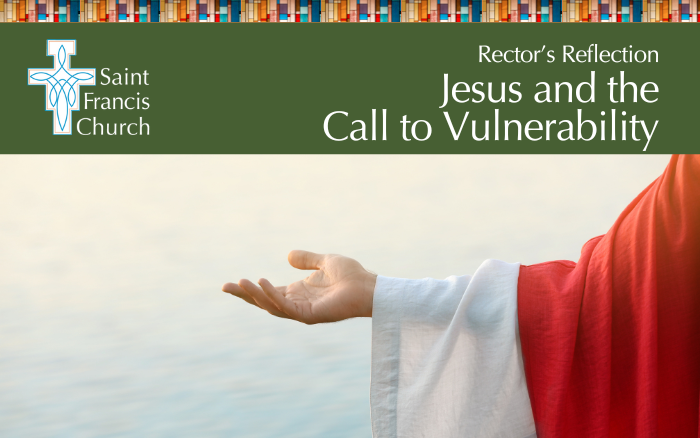“Vulnerability is the birthplace of love, belonging, joy, courage, empathy, and activity. It is the source of hope, empathy, accountability, and authenticity. If we want greater clarity in our purpose or deeper and more meaningful spiritual lives, vulnerability is the path.”
—Brene Brown, Daring Greatly.
I would love to have greater clarity in my purpose AND a deeper, more meaningful spiritual life. But what does it mean to be vulnerable? The dictionary definition is to be open to attack or damage, capable of being physically or emotionally wounded. The Latin root of our word vulnerable means to wound. So why would we willingly go down a path that will leave us open to physical and/or emotional wounds?
What does Jesus say about being vulnerable? A lot. His whole life was an experience in vulnerability, from birth to death. God made manifest made himself completely vulnerable to the world and all that was in it. According to the Gospel of Luke, Jesus was born in a stable and placed in a hay trough – a detail important enough to be included for the last two thousand years. Nobody in the ancient world put their baby in a hay trough, for most of the same reasons we wouldn’t do it now. Aside from the germs, it’s degrading to put a baby in such a lowly place. But maybe that’s the point. Even baby Moses was placed in a bassinet sealed with pitch before he was strategically placed in the water. From the beginning, Jesus was placed in a literal position of humility and vulnerability. It’s no wonder that one of the first things the angel said to Mary was, “Don’t be afraid.” Unfortunately, there was much to fear. When Jesus was presented in the Temple, Simeon said to Mary, “This child is destined for the rising and falling of many in Israel, and to be a sign that will be opposed so that the inner thoughts of many will be revealed – and a sword will pierce your own soul too,” (Luke 2:34b-35, NRSV).
In Matthew’s account, Jesus’ family was forced to flee from the mad king Herod to a land historically hostile to the Hebrews – again, placing not only Jesus but his whole family in a position of humility and vulnerability. People listening to the Gospel in the first century were sure to have made the connection between Jesus fleeing Herod and the Hebrews fleeing Pharaoh, though this time it was in reverse. Herod was so threatened by the idea of a king that he ordered the death of every male child born in the past two years. Some thirty-three years later, his namesake would feel just as threatened and ordered Jesus put to death. Is this where vulnerability leads us? Perhaps. But that’s a hard pill to swallow, and a terrible way to win people over. So how do we encourage being vulnerable as a way to deeper spirituality and clarity of purpose?
To be continued.
—Fr. Jason

